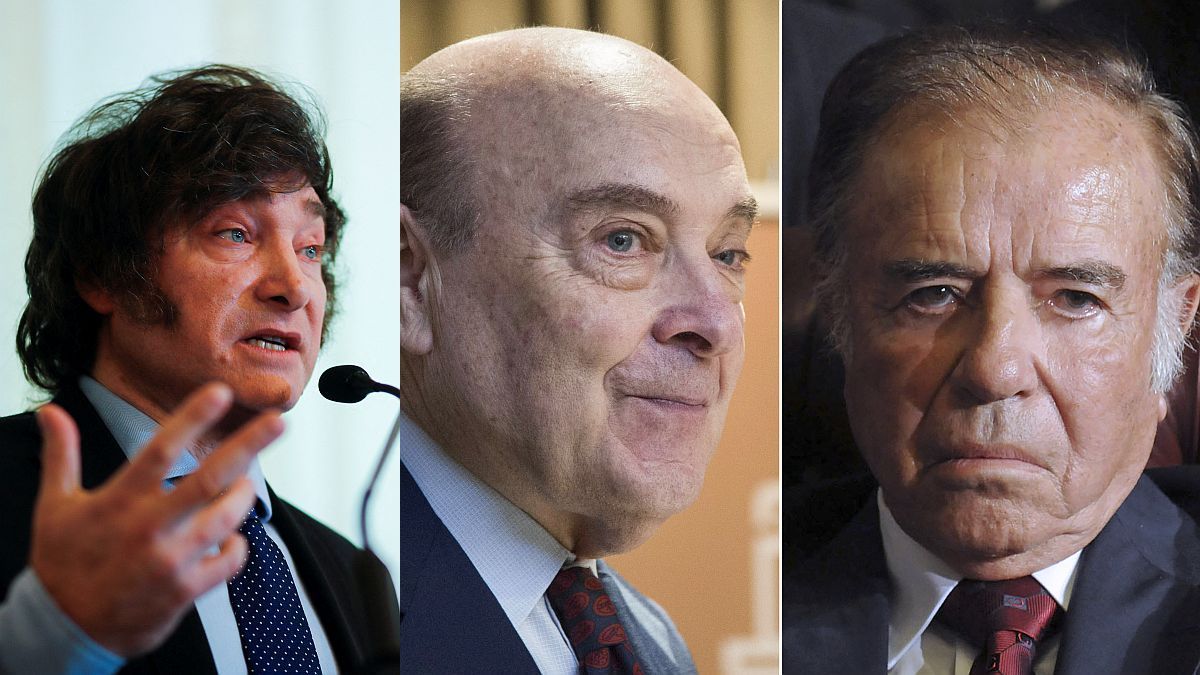The reality is that, since the “Cambiemos” phenomenon in Argentina, a culture has been installed with clumsy language and a patibular character that encourages hatred, violence, the love of money, selfishness and short-termism; generating toxic environments. Currently there are also too many coincidences between the candidate Javier Milei, his idol Carlos Menem and Patricia Bullrich.
At first Menem seemed more politically correct than Cavallo, but he also criticized the Pope and the church. In March 1992, the Pope noted with concern the consequences for the most vulnerable that the adjustment in Argentina was causing. To which Menem expressed his understanding of the little technical information that John Paul II had: “Perhaps to some extent his holiness does not have the statistics of how we have advanced in the field of unemployment” (Clarín March 26, 1992).
Cavallo offended the church in an arrogant and arrogant way, but without insults. “Laguna would have to reflect on the Gospel instead of talking about economics, about which he showed he knew nothing. The absurd descriptions of Laguna speak clearly of his intellectual incapacity” (Cavallo, Clarín December 19, 1993). “I am very respectful of the opinion of the bishops. But I am not going to discuss with them questions that affect economic policy unless they raise it in terms of a technical discussion with the Ministry of Economy” (Cavallo, La Nación March 22, 1996)
During the golden years of Convertibility, an attractive “leverage” of public and private debt had been expressed in Argentina in high GDP growth rates, a cycle characterized by the abundance of capital with low interest rates throughout the world. But in 1997 there was a “sudden stop” (Guillermo Calvo) or a sudden stop in the flow of capital from the central countries to the emerging countries, an unexpected interruption of income to the country, a contraction in the credit market – of a persistent nature – which led emerging countries with economies indebted in dollars to fiscal sustainability problems, just 3 years after the “Tequila effect” that shook the Argentine financial system.
The speed of reaction to contract spending and stop issuing debt was untimely slower than the dynamics of capital flight from emerging economies to places of greater security: there was, in short, what is called “flight towards quality.” ” (flight to the quality) in financial investment. Just as the changes in the political economy of Menemism towards the end of his period modified the relations between the State and civil society, they would also modify the style of presidential leadership, which would shift from the euphoria of reconstruction to moderation. In 1999, Menem’s great challenge was to maintain the model. That is, Menem started badly (1989-1991) and ended badly (1998-1999). In between, there were mixed and highly debatable macroeconomic results.
This cyclical and abrupt dynamic of presidential politics is valid, and also explains the relationship of citizens with the head of the Executive, to whom they then address demands for “forceful decisions,” and then tolerate excesses in the exercise. of the government. Although later this changes and moral questions appear and in the end the demonization of the outgoing president; The result is several resignifications of the same style of government (Pérez-Liñán, 2013, page 395).
And, finally, the disjunction, which appears when the consequences of the aforementioned policies can no longer be hidden, and the leader, therefore, is projected as “weak and incapable.” What follows is a kind of new beginning: the weak president gives rise to a “heroic solution” that quickly transforms the monetary and fiscal parameters, justifying them through a new “presidential reconstruction speech” based on a model that will be defended. and will once again impose an “interval of rigidity”, without correcting errors in public policy and thus enabling “a new crisis of disjunction on the horizon” (Ibid, page 396).
Menem himself had changed: he was no longer the disruptive presidentbut He was busy making sure his government work lasted. Menem had wanted to be re-elected to guarantee his continuity. According to Pérez-Liñán’s framework of analysis, he had gone from being a “great president,” a rebuilder, to one who was on the verge of his own disjunction.
And then De la Rúa, unable to achieve anything else, looked like Menem. But not the Menem of 1990, but the one of 1998, he would be trapped in the logic of Menemism of his last phase. For this reason, the continuity from Menem to De la Rúa that was celebrated by the technocratic elites (Caste of macroeconomists), the communicators and even the political scientists themselves was, in reality, a problem. De la Rúa should have started a recursive cycle, and not finished it. And the technocratic elites that accompanied him: “the caste of technopols”, were incapable of seeing that political problem that was looming.
Remember them and associate them. Milei represents a cartoonish synthesis between Menem’s sideburns, long hair and eccentricities, with Cavallo’s eyes and outbursts.. The others: Patricia Bullrich in 1993 was elected representative of Menem for CABA. From that position in the PJ bloc, she supported the policies adopted by Menem and Cavallo. Her Basic Unit had been left behind: “Evita Montonera”. She was already a member of “La Casta”.
In 1982, President Reynaldo Bignone, Carlos Melconian coincided as head of External Debt with Cavallo at the BCRA. Becoming a politician since 2003, he accepted the proposal to be Minister of Economy in an eventual third Menem government, he was immediately Macri’s economist, until today.
Melconian is someone who explains to you that “you can’t spend more on a house than you earn,” without considering the possibility that, “if you can’t pay the bills, you can get another job where they pay you more, to avoid the suffering of your family.” It is the logic of Rodolfo Zapata: “We are not going to work, We are not going to work”. Logic that he once expressed, inflation stops with 15% unemployment. He can’t understand that an embarrassed unemployed father doesn’t give a damn about the price of soda staying the same when he doesn’t have a job.
Roque Fernández and Carlos Rodríguez held positions and were the most important ideological references of Carlos Menem. Since 1979, his study center provided him with a famous minister to the province of Buenos Aires from the civil-military dictatorship and all his economists to Menem. Carlos Alfredo Rodríguez worked at the Agency for International Development, un agency that receives strategic directives from the State Department. Between 1996 and 1998 he served as head of the Cabinet of Advisors to the Minister of Economy and as Secretary of Economic Policy of his friend Roque Fernández. He resigned from office after President Menem denied him the privatization of the Banco de la Nación Argentina. Lately, Carlos Menem’s former vice minister of Economy assured that dollarizing is “a trend”…? and that a Bonex Plan “would be a favor” for fixed-term holders (Infobae, May 24, 2023)
Why should we think that, with the same actors and the same ideas, everything would be different?
“Two things are infinite: human stupidity and the universe; and I’m not sure about the second.” “Not everything that counts can be quantified, and not everything that can be quantified counts.” “Insanity is doing the same thing over and over again expecting different results” (Albert Einstein).
Director of Esperanza Foundation. https://fundacionesperanza.com.ar/ UBA Postgraduate Professor and Master’s Degrees at private universities. Master in International Economic Policy, Doctor in Political Science, author of 6 books
Source: Ambito
David William is a talented author who has made a name for himself in the world of writing. He is a professional author who writes on a wide range of topics, from general interest to opinion news. David is currently working as a writer at 24 hours worlds where he brings his unique perspective and in-depth research to his articles, making them both informative and engaging.




